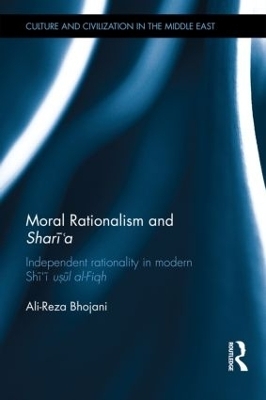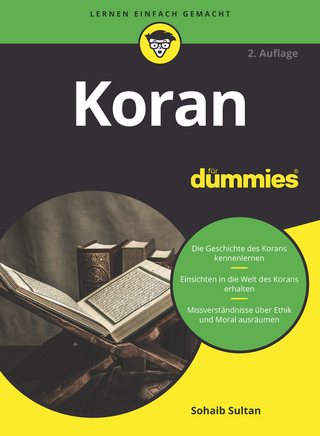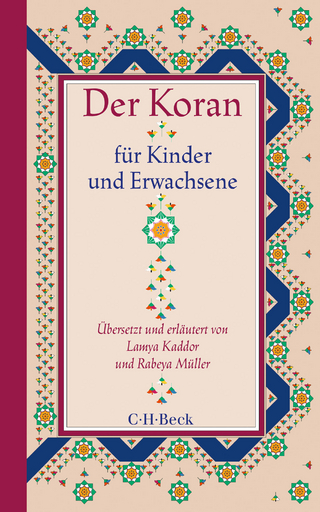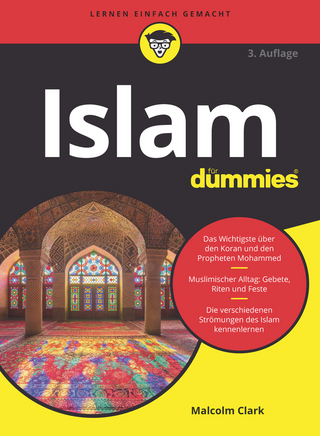
Moral Rationalism and Shari'a
Independent rationality in modern Shi'i usul al-Fiqh
Seiten
2015
Routledge (Verlag)
978-1-138-80026-7 (ISBN)
Routledge (Verlag)
978-1-138-80026-7 (ISBN)
Moral rationalism and Shari’a is the first attempt at outlining the scope for a theological reading of Sharī 'a, based on a critical examination of why the 'Adliyya theological ethics hasn’t significantly impacted Shī'ī readings of Shari’a and how these resources may come to do so.
Moral Rationalism and Sharī'a is the first attempt at outlining the scope for a theological reading of Sharī'a, based on a critical examination of why 'Adliyya theological ethics have not significantly impacted Shī'ī readings of Sharī'a.
Within Shī'ī works of Sharī 'a legal theory (usūl al-fiqh) there is a theoretical space for reason as an independent source of normativity alongside the Qur’ān and the Prophetic tradition. The position holds that humans are capable of understanding moral values independently of revelation. Describing themselves as 'Adliyya (literally the people of Justice), this allows the Shī 'a, who describe themselves as 'Adiliyya (literally, the People of Justice), to attribute a substantive rational conception of justice to God, both in terms of His actions and His regulative instructions. Despite the Shī'ī adoption of this moral rationalism, independent judgments of rational morality play little or no role in the actual inference of Sharī 'a norms within mainstream contemporary Shī'ī thought.
Through a close examination of the notion of independent rationality as a source in modern Shī'ī usūl al-fiqh, the obstacles preventing this moral rationalism from impacting the understanding of Sharī 'a are shown to be purely epistemic. In line with the ‘emic’ (insider) approach adopted, these epistemic obstacles are revisited identifying the scope for allowing a reading of Sharī'a that is consistent with the fundamental moral rationalism of Shī'ī thought. It is argued that judgments of rational morality, even when not definitively certain, cannot be ignored in the face of the apparent meaning of texts that are themselves also not certain. An 'Adliyya reading of Sharī'a demands that the strength of independent rational evidence be reconciled against the strength of any other apparently conflicting evidence, such that independent judgments of rational morality act as a condition for the validity of precepts attributed to a just and moral God.
Moral Rationalism and Sharī'a is the first attempt at outlining the scope for a theological reading of Sharī'a, based on a critical examination of why 'Adliyya theological ethics have not significantly impacted Shī'ī readings of Sharī'a.
Within Shī'ī works of Sharī 'a legal theory (usūl al-fiqh) there is a theoretical space for reason as an independent source of normativity alongside the Qur’ān and the Prophetic tradition. The position holds that humans are capable of understanding moral values independently of revelation. Describing themselves as 'Adliyya (literally the people of Justice), this allows the Shī 'a, who describe themselves as 'Adiliyya (literally, the People of Justice), to attribute a substantive rational conception of justice to God, both in terms of His actions and His regulative instructions. Despite the Shī'ī adoption of this moral rationalism, independent judgments of rational morality play little or no role in the actual inference of Sharī 'a norms within mainstream contemporary Shī'ī thought.
Through a close examination of the notion of independent rationality as a source in modern Shī'ī usūl al-fiqh, the obstacles preventing this moral rationalism from impacting the understanding of Sharī 'a are shown to be purely epistemic. In line with the ‘emic’ (insider) approach adopted, these epistemic obstacles are revisited identifying the scope for allowing a reading of Sharī'a that is consistent with the fundamental moral rationalism of Shī'ī thought. It is argued that judgments of rational morality, even when not definitively certain, cannot be ignored in the face of the apparent meaning of texts that are themselves also not certain. An 'Adliyya reading of Sharī'a demands that the strength of independent rational evidence be reconciled against the strength of any other apparently conflicting evidence, such that independent judgments of rational morality act as a condition for the validity of precepts attributed to a just and moral God.
Ali-Reza Bhojani is a Post-Doctoral Fellow at the Al-Mahdi Institute, Birmingham. His research interests include Islamic legal theory, Muslim theology and ethics, Shī'ī studies and the Muslim religious responses to modernity.
Introduction 1 Reason as a source of Sharī 'a in Shī 'ī usūl al-fiqh 2 The intelligibility of moral values in Shī 'ī theological thought 3 The nature of morality, rationality and independent judgments of rational morality in modern Shī 'ī usūl al-fiqh 4 The nature of morality, rationality and independent judgments of rational morality in modern Shī 'ī usūl al-fiqh 5 Reassessing the obstacles to independent judgments of rational morality impacting the reading of Sharī 'a
| Reihe/Serie | Culture and Civilization in the Middle East |
|---|---|
| Zusatzinfo | 3 Line drawings, black and white; 3 Illustrations, black and white |
| Verlagsort | London |
| Sprache | englisch |
| Maße | 156 x 234 mm |
| Gewicht | 430 g |
| Themenwelt | Geisteswissenschaften ► Philosophie |
| Geisteswissenschaften ► Religion / Theologie ► Islam | |
| Recht / Steuern ► Allgemeines / Lexika | |
| Recht / Steuern ► EU / Internationales Recht | |
| Sozialwissenschaften ► Soziologie ► Spezielle Soziologien | |
| ISBN-10 | 1-138-80026-0 / 1138800260 |
| ISBN-13 | 978-1-138-80026-7 / 9781138800267 |
| Zustand | Neuware |
| Haben Sie eine Frage zum Produkt? |
Mehr entdecken
aus dem Bereich
aus dem Bereich


